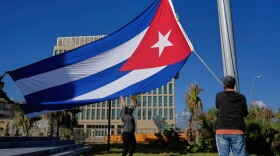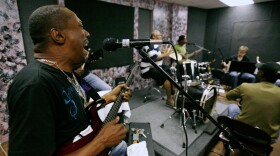-
The Cuban government has revealed the identities of 32 military personnel killed during the U.S. capture of Venezuelan President Nicolás Maduro.
-
Venezuelan officials say at least 24 of the country's security officers were killed in the dead-of-night U.S. military operation to capture Nicolás Maduro and spirit him to the United States to face federal drug charges.
-
A little over 48 hours after U.S. troops removed Venezuelan President Nicolás Maduro from power, top Florida Republicans say they are certain that democracy is coming to the South American nation.
-
President Trump is set to meet with House Republicans Tuesday at the Kennedy Center as lawmakers in both chambers are calling for more details on the recent operation in Venezuela.
-
Venezuelan leaders are asserting the country's independence after the U.S. captured President Nicolás Maduro. On Monday, politicians in Caracas reelected their longtime speaker and condemned Maduro's capture by U.S. forces. Maduro's son, Nicolás Maduro Guerra, called for his father's return and international support.
-
Venezuela's Nicolás Maduro and his wife, Cilia Flores have pleaded not guilty to all charges during their first court appearance in their federal narco-terrorism case.
-
The “pollera,” a bell skirt with layered petticoats, is the traditional dress of Indigenous women in Bolivia’s highlands.
-
Defense Secretary Pete Hegseth says the Pentagon will not publicly release unedited video of a strike that killed two survivors of an initial attack on a boat allegedly carrying cocaine in the Caribbean.
-
The U.S. military struck three boats it suspected of carrying drugs in the eastern Pacific on Monday, killing eight people, the U.S. Southern Command announced.
-
The government of Trinidad and Tobago says it will allow the U.S. military access to its airports in upcoming weeks as tensions between the United States and Venezuela remain high. Monday's announcement came after the U.S. military recently installed a radar system at the airport in Tobago. American strikes on alleged drug boats in the Caribbean began in September and have killed more than 80 people.
-
José Antonio Kast, a far-right politician, who has praised Chile's dictatorship, has won the presidency, signaling a sharp rightward shift fueled by fears over crime, migration, and the economy.
-
Compas, a beloved Haitian music and dance genre inspired by merengue and infused with percussion, has made UNESCO’s cultural heritage list. The syncopated rhythm, created in the 1950s, wafts from bars, bedrooms and businesses across Haiti, lifting spirits and providing solace from the country’s grinding poverty and soaring gang violence.
Play Live Radio
Next Up:
0:00
0:00
Available On Air Stations












